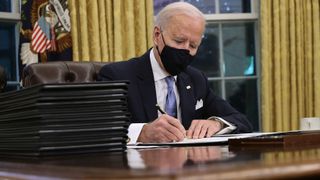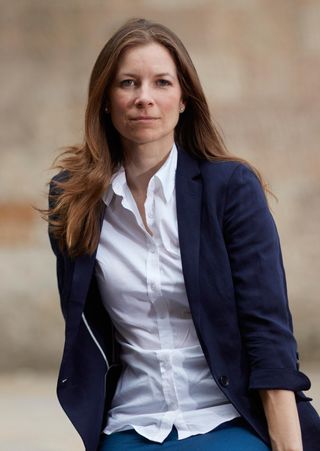On TIME Magazine's cover this week, the 46th President of the United States reports for his first day of work to find the hastily vacated office in a state of disarray: ransacked papers litter the Oval Office floor while smoke rises outside the windows, in scenes reminiscent of the Capitol building attacks. On the Resolute desk, a landline phone sits knocked off its cradle, beeping a continuous busy signal.
It has certainly been a busy January, with insurrection, impeachment and now inauguration. The first day of the Biden/Harris administration gave us a few glimpses into the direction of the new team, and its early focus on tackling key challenges.
With 400,000 Americans dead and more than 4000 dying every day of COVID-19, Biden's first executive orders focused on the immediate crisis. Authorising the Defense Production Act to co-ordinate private-sector manufacturing of critical supplies, Biden also implemented a 100-day mask mandate covering federal property - an initiative projected to save some 50,000 lives by April. The actions represented some of the most comprehensive federal responses yet, and came as a welcome relief for weary states that had been left to source and co-ordinate everything from tests to vaccine-distribution logistics.
America is back at the table
Biden also re-established co-operation with the global community of scientists, scholars and medical practitioners in rejoining the World Health Organization. For the WHO, this comes just in time to halt the exodus of American colleagues from the organisation, who would have been forced to abandon scientific collaboration sans membership. A return to the Paris Agreement also reaffirmed one of the most highly subscribed treaties and signalled a return to science-led leadership, and a rejection of "alternative facts" in favour of tackling common challenges with allies.
Manufactured facts did get a mention in Biden's inaugural speech. Gone were references to American carnage, America first, and victory reserved for the President's own supporters. Biden encouraged all Americans to "listen to each other, hear each other, see each other", noting that "every disagreement doesn't have to be a cause for total war" while placing the blame for some of the divisions and distrust on "manufactured facts" that seed violence. With its focus on hope and resilience, Biden's inaugural speech was part admonition, part pep talk. The kind of pep talk delivered by a coach in the middle of a game that's going quite badly. Reminding the team of their common purpose, urging players to move beyond their petty squabbles, appealing not just to skill but to character and sportsmanship to carry the day.
Perhaps then, the final "i" in January is inclusion. The Biden/Harris administration marks a historic first: the first female Vice-President, Kamala Harris. Her husband is now known by the newly created title "second gentleman" (despite this scholar's extensive lobbying for "second laddie"). In a nod towards restoring America's reputation for inclusion as a "shining beacon on a hill", Biden reversed Trump's executive orders including the Muslim ban, the deportation of protected visa holders under DACA, and the separation of families seeking asylum. The party of "law and order" has given way to the rule of law with a dose of humility and empathy.
It's most apparent in the White House press room, named for Jim Brady, the namesake of the Brady bill which mandated background checks and waiting periods for firearms. Missing at the lectern was the name-calling, the misleading visuals, the empty props and the denigration of the press corps (Trump called the free press "enemies of the people" more than 70 times). Saturday Night Live will have to look a little harder for its material this season. But at least parents around the world can, once again, let their kids watch a presidential address.






